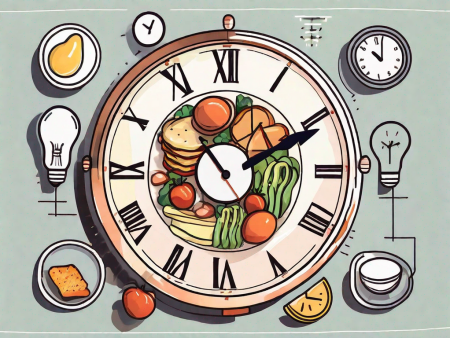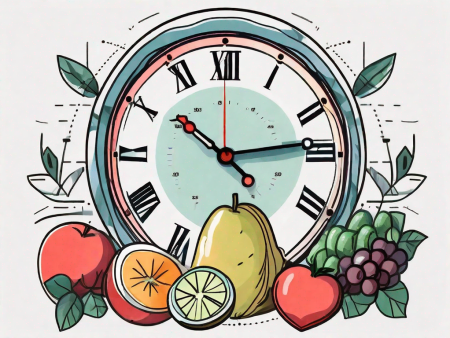Discover effective strategies to maintain or increase your energy levels as you age.
How to Maintain or Increase Energy Levels as You Age
Feeling tired and drained as you age is no fun. But fear not, my friend, because I’ve got some tips and tricks up my sleeve to help you maintain or even increase your energy levels as the years go by. So, grab a cup of tea, sit back, and let’s dive into the secrets of staying energized!

Understanding the Aging Process and Energy Levels
We’ve all heard the saying, “age is just a number.” And while it’s true that you’re only as old as you feel, it’s important to understand the biological changes that happen as we age.
First off, let’s talk about the impact of aging on our energy levels. As we get older, our metabolism slows down, which means our bodies burn calories at a slower rate. This can lead to feelings of fatigue and sluggishness.
But don’t lose hope just yet! There are plenty of things you can do to counteract the effects of aging on your energy levels. Let’s explore them together.
Biological Changes and Energy Levels
Our bodies go through a variety of changes as we age, and some of these changes can directly impact our energy levels. For example, a decrease in muscle mass and an increase in fat mass can contribute to feelings of fatigue.
Additionally, hormonal changes, such as a decrease in testosterone or estrogen levels, can also affect our energy levels. As we age, our bodies produce less of these hormones, which can lead to a decrease in energy. However, it’s important to note that these changes are not inevitable and can be managed with the right approach.
One way to combat the decrease in muscle mass is through regular exercise. Strength training exercises can help build and maintain muscle, which can in turn boost your energy levels. Additionally, incorporating cardiovascular exercises into your routine can improve your overall fitness and stamina.
In terms of hormonal changes, it’s important to consult with a healthcare professional who can provide guidance and potentially recommend hormone replacement therapy if necessary. This can help balance hormone levels and alleviate some of the energy-related symptoms associated with aging.
Common Misconceptions About Aging and Energy
Before we dive into the nitty-gritty of maintaining and boosting your energy levels, let’s bust a few myths surrounding aging and energy.
Contrary to popular belief, age itself is not the sole determinant of your energy levels. Sure, our bodies change as we get older, but your lifestyle choices play a significant role in how energized you feel.
For instance, maintaining a healthy diet can provide your body with the necessary nutrients and fuel to sustain optimal energy levels. Incorporating a variety of fruits, vegetables, whole grains, and lean proteins into your meals can help support your energy needs.
Furthermore, staying hydrated is crucial for maintaining energy levels. Dehydration can lead to feelings of fatigue, so it’s important to drink an adequate amount of water throughout the day.
Another lifestyle factor that can impact your energy levels is sleep. As we age, our sleep patterns may change, and we may require less sleep than when we were younger. However, it’s still important to prioritize quality sleep and establish a consistent sleep routine to ensure your body gets the rest it needs.
Lastly, managing stress is key to maintaining optimal energy levels. Chronic stress can drain your energy and leave you feeling exhausted. Incorporating stress management techniques such as meditation, deep breathing exercises, or engaging in hobbies can help reduce stress and boost your overall energy.
So, let’s put those misconceptions aside and focus on what you can do to keep that pep in your step! By understanding the biological changes that occur with aging and making conscious lifestyle choices, you can maintain and even enhance your energy levels as you age.
Nutrition for Sustained Energy
If you want to maintain or increase your energy levels as you age, a balanced diet is key. Here are some essential nutrients that play a crucial role in energy production:
When it comes to sustaining energy levels, it’s not just about the quantity of food you eat, but also the quality. One of the most important groups of nutrients for energy production is the B vitamins. These vitamins, including B1 (thiamine), B2 (riboflavin), B3 (niacin), B5 (pantothenic acid), B6 (pyridoxine), B7 (biotin), B9 (folate), and B12 (cobalamin), are known as the powerhouse of energy production. They help convert the food you eat into usable energy for your body. Foods rich in B vitamins include whole grains, leafy greens, lean meats, and fortified cereals. By incorporating these foods into your diet, you can give yourself a much-needed boost of energy.
In addition to B vitamins, another essential nutrient for energy production is iron. Low iron levels can lead to fatigue and decreased energy. Iron is necessary for the production of hemoglobin, a protein in red blood cells that carries oxygen to your body’s tissues. Without enough iron, your body may struggle to deliver oxygen efficiently, resulting in feelings of tiredness. To ensure you’re getting enough iron, incorporate iron-rich foods like spinach, beans, lentils, and fortified cereals into your diet.
While focusing on specific nutrients is important, we can’t neglect the overall importance of hydration. Dehydration can zap your energy levels faster than you can say “H2O.” Water is essential for numerous bodily functions, including energy production. It helps transport nutrients to your cells, regulates body temperature, and aids in digestion. So, drink up and keep your body hydrated for optimal energy levels.
Meal Planning for Optimal Energy
Now that we’ve covered the essential nutrients, it’s time to talk about meal planning. Breaking news: three square meals a day might not be the best approach for sustained energy levels.
Instead of sticking to the traditional three meals a day, try eating smaller, more frequent meals throughout the day. This approach can help keep your blood sugar levels stable and prevent energy crashes. When planning your meals, aim for a balance of proteins, healthy fats, and complex carbohydrates. Proteins provide the building blocks for energy production and help keep you feeling full and satisfied. Healthy fats, such as those found in avocados, nuts, and olive oil, provide a slow and steady source of energy. Complex carbohydrates, like whole grains, legumes, and starchy vegetables, provide a sustained release of energy and help regulate blood sugar levels.
In addition to macronutrients, don’t forget to include plenty of fruits and vegetables in your diet. They’re packed with vitamins, minerals, and antioxidants that can help keep your energy levels up and your immune system strong. Fruits like oranges, berries, and bananas are not only delicious but also provide a natural source of energy due to their high content of natural sugars and fiber. Vegetables like spinach, kale, and broccoli are rich in vitamins and minerals that support energy production and overall health.
The Role of Physical Activity in Energy Maintenance
Now that we’ve covered nutrition, let’s talk about the role of physical activity in maintaining and boosting your energy levels.
Physical activity is not only important for maintaining a healthy weight and improving cardiovascular health, but it also plays a crucial role in sustaining and enhancing your energy levels throughout the day. Engaging in regular exercise can provide you with a natural energy boost and improve your overall quality of life.
Benefits of Regular Exercise for Seniors
Exercise is not just for the young and spry. In fact, regular physical activity can work wonders for your energy levels as you age.
When you exercise, your body releases endorphins, those feel-good chemicals that give you a natural energy boost. These endorphins act as natural painkillers and mood elevators, helping to combat fatigue and enhance your overall well-being.
Regular exercise can also improve your cardiovascular health, increasing your heart’s efficiency in pumping blood and oxygen throughout your body. This improved circulation can provide your muscles and organs with the necessary nutrients and oxygen, giving you a sustained energy supply.
Additionally, engaging in physical activity can increase muscle strength and endurance. As you age, maintaining muscle mass becomes increasingly important for energy maintenance. Strong muscles help support your body’s structure, improve posture, and prevent fatigue and weakness.
Furthermore, regular exercise can have a positive impact on your mental health. It can reduce symptoms of anxiety and depression, boost your self-confidence, and improve your cognitive function. When your mind is in a healthy state, you are more likely to feel energized and motivated.
Choosing the Right Exercise for Your Age and Fitness Level
Now, before you strap on those running shoes and hit the pavement, it’s essential to choose the right exercise for your age and fitness level.
Low-impact exercises such as walking, swimming, and cycling can be gentle on your joints while providing a fantastic energy boost. These activities allow you to engage in cardiovascular exercise without putting excessive strain on your knees, hips, and ankles.
Yoga and tai chi are also excellent options for improving balance, flexibility, and overall well-being. These mind-body exercises not only help you build strength and increase energy levels but also promote relaxation and stress reduction.
It’s important to listen to your body and choose activities that you enjoy and feel comfortable with. Remember that exercise should be a source of enjoyment and not a chore. By finding activities that you love, you are more likely to stick with them and reap the long-term benefits.
Always remember to consult with a healthcare professional before starting any new exercise program, especially if you have any underlying health conditions or concerns. They can provide you with personalized guidance and ensure that you are engaging in activities that are safe and suitable for your individual needs.
Safety first, my friend! Take care of your body and mind, and enjoy the energizing benefits of regular physical activity.
Importance of Quality Sleep for Energy Levels
We’ve covered nutrition and exercise, but we can’t forget about the importance of quality sleep in maintaining and increasing your energy levels.
How Sleep Patterns Change with Age
As we age, our sleep patterns can change. You may find yourself waking up more frequently during the night or struggling to fall asleep in the first place.
But fear not, my friend! There are things you can do to improve your sleep quality and ensure you wake up feeling refreshed and energized.
Tips for Improving Sleep Quality
Create a sleep-friendly environment by making your bedroom comfortable, cool, and dark. Invest in a supportive mattress and pillows, and banish all electronic devices from the bedroom.
Establish a calming bedtime routine that helps signal to your body that it’s time to wind down. This could include activities such as reading a book, taking a warm bath, or practicing relaxation techniques like deep breathing or meditation.
Avoid heavy meals, caffeine, and alcohol close to bedtime, as they can disrupt your sleep patterns. And finally, stick to a consistent sleep schedule by going to bed and waking up at the same time each day. Your body loves routine!
Mental Health and Energy Levels
Last but not least, let’s talk about the impact of mental health on your energy levels. Yep, your mind plays a significant role in how energized you feel.

The Impact of Stress and Anxiety on Energy
Stress and anxiety can zap your energy faster than you can say “calm down.” When you’re feeling stressed or anxious, your body releases stress hormones, which can leave you feeling drained and exhausted.
So, how can you combat this energy-sucking duo? Well, my friend, it’s all about finding healthy ways to manage stress and anxiety.
Mindfulness and Relaxation Techniques for Energy Boost
Consider incorporating mindfulness and relaxation techniques into your daily routine. This could include activities such as meditation, deep breathing exercises, or gentle yoga.
Taking time for yourself, practicing self-care, and surrounding yourself with positive people and activities can also do wonders for your mental health and energy levels.
In Summary
So, my dear friend, there you have it – a guide to maintaining or even increasing your energy levels as you age. Remember, age is just a number, and with a little bit of effort and some lifestyle tweaks, you can feel energized and vibrant at any age.
Take care of your body by nourishing it with nutrient-dense foods, staying active, getting quality sleep, and nurturing your mental health. And most importantly, don’t forget to take time for yourself and enjoy the journey. Life is meant to be lived with boundless energy!








Your article helped me a lot, is there any more related content? Thanks!
Thank you for your sharing. I am worried that I lack creative ideas. It is your article that makes me full of hope. Thank you. But, I have a question, can you help me?
Thank you for your sharing. I am worried that I lack creative ideas. It is your article that makes me full of hope. Thank you. But, I have a question, can you help me?
Hey! Do you know if they make any plugins to assist with SEO?
I’m trying to get my website to rank for some targeted keywords but I’m
not seeing very good results. If you know of any please share.
Kudos! I saw similar blog here: Eco product